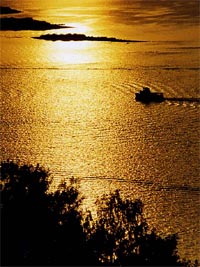|
Volga Vocation: Today’s Problems,
Tomorrow’s Challenges
 Challenges and obstacles in the
Volga Basin’s development are reviewed in a new
report published February 2007 under the auspices of
the CABRI-Volga project. Prepared by Wageningen
University of the Netherlands in collaboration with
the Cadastre Institute of Yaroslavl, Russia, this
latest release builds on a wealth of data gathered
mainly during the project’s second expert group
forum of water management experts in Kazan in April
2006. Challenges and obstacles in the
Volga Basin’s development are reviewed in a new
report published February 2007 under the auspices of
the CABRI-Volga project. Prepared by Wageningen
University of the Netherlands in collaboration with
the Cadastre Institute of Yaroslavl, Russia, this
latest release builds on a wealth of data gathered
mainly during the project’s second expert group
forum of water management experts in Kazan in April
2006.
It reveals that the three major
obstacles to achieving sustainable development
within the Volga basin are: i) poor water quality;
ii) weak basin management; and iii) low public
awareness and participation in decisionmaking
processes. The challenge in overcoming these is
compounded by external “drivers” and “constraints,”
such as the pace of economic development and
globalisation, climate change, technological
innovation, political and social processes.
A wealth of strategic responses
are put forward that draw on the insights of the
consulted experts. Recommendations range from
changes in taxation for water use and wastewater
discharge, to implementation of environmental
regulation at the municipal level. In ensuring civil
society involvement in river basin management,
unification of the monitoring system, enhancing
public access to and pro-active dissemination of
information by the state are advocated.
The authors conclude by suggesting
the development of enforceable water pollution
standards, alongside the more effective enforcement
of the “polluter-pays” principle. This would
generate funds that could be channelled back into
improving water quality.
Packed with additional information
on the Volga basin’s environment and
socio-economical situation concerning water usage,
flood risk, freight transport and the respective
institutional and governance frameworks, the report
is now available for download at:
http://cabri-volga.org/publications.html..
|
 |
Download full
document (94-page, 840-KByte PDF) |